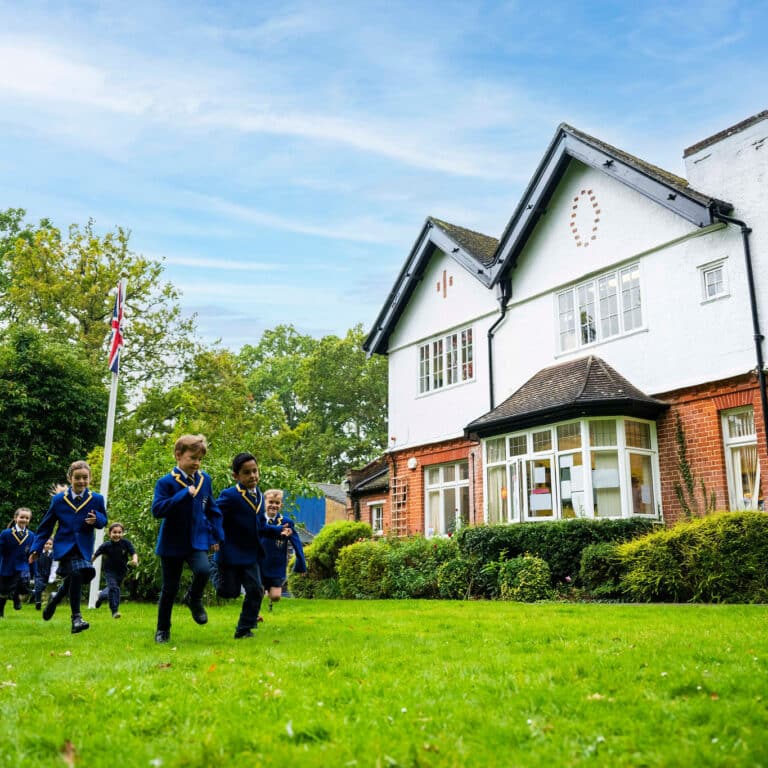In England, most children will attend either a primary or preparatory school (prep school) for the first years of their formal education. There are currently just under 25,000 primary schools and over 500 prep schools in the country.
So what are the key differences between the two types of schools? Many of us will be familiar with the term ‘Preparatory school’, but what exactly is a prep school and how do children benefit from an education within one?
What is a prep school?
Traditionally, Preparatory or ‘prep’ schools are independent schools that educate children from the age of 8-13. At Sherborne House School, we educate children from 6 months – 11 and our Nursery is where the journey begins.
The term preparatory is used as it describes how the schools prepare children effectively for the next step of their education at senior schools, regardless of destination, where they will usually complete GCSEs and A-Levels.
The Curriculum
Unlike mainstream primary schools, Preparatory schools are not restricted to following the national curriculum. This independence gives prep schools the freedom and flexibility to deliver a curriculum that not only aligns with their vision and ethos, but can also be tailored to the needs of individual children. Children are not subjected to the ‘one size fits all’ approach and pupils are not expected to take the Standard Assessment Tests (SATs).
As members of The Independent Association of Prep Schools, we are required to deliver a broad and balanced curriculum. We believe that the key to successful learning starts with developing strong oracy, comprehension and written expression from a very early age. Our pupils are immersed in a thematic curriculum that is literature-rich and centred around building core transferable skills that equip them in developing key knowledge and an understanding of the world around them, whilst being meaningful and relevant to their everyday experiences.
Pupils at Sherborne House are prepared well for the next stage of education, whether this be in a state, private or grammar setting. Children are exposed to a wide range of learning and assessment materials to ensure that they are given opportunities to explore and gain confidence with all options.
Class Sizes
Prep schools tend to boast smaller class sizes. Children benefit from more individual time and attention from teachers who can better assess a child’s progress and tailor their learning accordingly. Teachers can also build an in-depth understanding of each child and gain a deeper familiarity with their strengths, weaknesses, and needs.
Smaller class sizes also enable children to build better relationships with their teachers and classmates, which encourages better class cohesion and less disruption.
Specialist Teachers
Rather than being taught all subjects by a single generalist teacher, many children attending a preparatory school will enjoy some lessons led by subject specialist teachers. These teachers have substantial expertise and enthusiasm for their respective curriculum area and can best support pupils of all abilities to reach their potential.
At Sherborne House School, we are privileged to have specialist teachers for sport, Forest School, languages, music and drama, as well as teachers with English and maths subject specialisms.
Extra-Curricular Opportunities
The educational experience at preparatory schools is enriched by the wide range of extra-curricular opportunities available to pupils. At our school we offer a variety of opportunities including:
~ An action-packed enrichment offer, ranging from coding and sewing, alongside a diverse range of extracurricular clubs, and Forest School & Bushcraft.
~ High calibre sports coaching and development of skills leading teams to National level in netball and football.
~ Outstanding Performing Arts through LAMDA from Year 4, instrument and vocal tuition and musical and drama productions.
~ A reputable and dynamic Steps to Leadership Programme, as well as positions of responsibility for pupils as Senior Prefects and Prefects, or as School Council, Well-being Ambassadors, Sports Leaders and/or Digital Leaders.
~ An extended and immersive academic provision, inclusive of scholarship clubs, to help pupils to secure consistently high grades and impressive scholarship awards to some of the country’s top senior schools.
~ An exciting range of trips (Reception to Year 6), both local, national and international with residential stays/ trips for pupils from Year 2 upwards.
~ One of the benefits of a good prep school is the range of after school activities and many also have breakfast clubs – a bonus for working parents. At Sherborne House, we offer wraparound care from 7.30am to 6pm, Monday to Friday.
A wide range of activities and initiatives is a key advantage because it provides children with a more well-rounded education and broadened perspective. Pupils are able to discover and nurture new skills and interests whilst building confidence, responsibility and valuable soft skills. They also develop strong friendships, have fun and improve their well-being.
Prep School Open Days: What To Look For
If you want to get a feel for a prep school, attend their open days. Don’t be dazzled by facilities or disheartened by a dearth – look beyond. Prepare a list of questions and things to look for before you visit a school. Consider the questions that we have compiled previously: Navigating School Open Days.
The best way to see how your child will benefit from an education at Sherborne House School is to visit us. We would be delighted to welcome you into school for a tour and meeting with our Head, Cordelia Cripps.
To book a personalised tour of the school, please contact our Registrar, Estelle Szasz admissions@sherbornehouse.co.uk
Call 02380 252440
Visit us on social media:
Facebook – Sherborne House School
Instagram – @sherbornehouseschool
#prepschool
#preparatoryschool
#primaryschool
#openday


